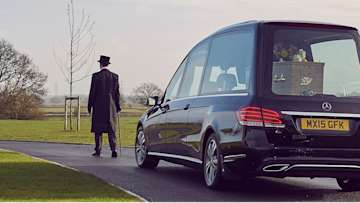‘I grew up in the funeral business. My father was the village funeral director, so my brother and I were used to him being on call, going out in the middle of the night. Whenever we weren't in school, we'd come to work with Dad and he'd have us cleaning the hearses or teaching us how to fit and line the coffins.
‘I took over the business from my father 4 years ago. He’d been working in the funeral home since 1985 but the original owner had to sell up after falling ill and there was no one in his family who could take over. Co-op had a long history, and a good name, in the funeral world so he decided to sell to them in 1987. My father was then invited to run the business and – 18 years later – I followed in his footsteps.
‘Dad originally wanted me to do something different, as he knew what was involved in the job. I went to university and did a degree in design, then a Masters in product design and innovation. I ended up working for a waste management company, but Dad was coming to the end of his career, plus he’d worked so hard to build up the business, that it felt natural for me to take over.’
What makes a good funeral director?
‘I always knew I wanted to work in the industry, but I’m glad I didn’t do it straight out of school. You do need a bit of life experience, so you understand how to read a situation and communicate sensitively. For example, supporting a family where someone died at the age of 18 needs a very different demeanour to someone who died in their 90s after a good life.
‘You need to be quite an organised person – I like that attention to detail. A funeral director is a bit like a wedding planner, but you get a fraction of the time you’d get with a wedding. In about a week, you have to contact the printers, the florists, the coffin manufacturers, organise any transport – essentially everything you need to put a funeral together. You can feel a bit like a swan swimming on a lake, legs paddling away underneath a calm presentation.’
What does a funeral director do?
‘It’s not a 9-5 job as people don’t only die between 9 and 5! If a family have discussed funeral plans before a loved one dies, they’ll come into the office and go through the arrangements in advance. But if someone dies suddenly, or we have to collect them from hospital, that might be the first time we meet the family. I like to be there from the moment someone passes away, to help and guide the family, to sit down with a cuppa and make the funeral arrangements, all the way through to directing the funeral and beyond, such as dealing with the ashes.
‘When a family invite me into their home I could be there for hours, finding out about the person who died. I might say, “Tell me all about Mum. What did she like doing? What were her hobbies?” If she loved knitting, we could provide a woollen coffin. If Dad volunteered with the local lifeboat crew, we could get the rest of the boys to carry the coffin. You find out everything you can about the person, to help make their funeral unique.
‘Every day is different. If someone’s not local, I might work with a coroner to sort out the paperwork we need to transport the body back home. If someone dies abroad and we need to repatriate them, that can be even more challenging. It’s not a straightforward job but I wouldn’t have it any other way. Nothing else would give me the same satisfaction of knowing I’ve helped people.’





